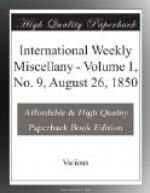* * * * *
[FROM THE ATHENAEUM.]
THE NEW PROPHET IN THE EAST.[5]
The vicissitudes of the war in the Caucasus of late have been surprising enough to awaken the interest of Western Europe, even amidst her own nearer anxieties. Last year it was said that the conquest of Achulgo, the stronghold of the redoubtable Schamyl, had effectually broken the power of that daring leader. In direct contradiction to such reports, later accounts from Daghestan tell of the reappearance of the notable partisan amidst the lines of the Russians, and of a defeat of the latter, the most severe, if the details of the event be true, that they have yet suffered in the Caucasus. In any case, these exciting changes of fortune would be in favor of a book professing to describe this interesting region, and to add to our knowledge of its brave inhabitants. The main interest of Herr Bodenstedt’s work will now be enhanced by its undertaking to give a more precise account than had previously appeared of the priest-warrior of Daghestan. and of the new sect as the prophet of which he succeeded in arraying the independent mountain clans against their common enemy with a kind of combination unknown in earlier periods of the struggle.
[Footnote 5: The people of the Caucasus, and their Struggle for Liberty with the Russians—(Die Volker des Caucasus, &c.) By Friedrich Bodenstedt. Second Edition. Frankfurt am Main, Lizius; London, Nutt.]
The author has evidently lived for some time in the region which he describes, or in the bordering districts along the Caspian, both in Georgia and in North Daghestan, His acquaintance with Asiatic and Russian languages and customs appears to have been gained both by study and from intercourse with the natives of the south-eastern frontier. He is not ignorant of Oriental writings that refer to his subject; and his Russian statistics prove an access to official authorities which are not to be found in print. These, however obtained, can scarcely have been imparted to him as one of those writers whom the Court of St. Petersburg hires to promote its views through the press of Western Europe. His sympathies are declared against Russian usurpation; and the tendency of his essay is to prove how little real progress it has yet made in subduing the Caucasus, the enormous waste of money and life with which its fluctuating successes have been bought, and the fallacy of expecting a better result hereafter.
What it has cost in life on the Russian side to attack-hitherto with no lasting effect—the handful of Caucasian mountaineers, may be guessed from a single note, dated 1847: “The present Russian force in the Caucasus”—including of course, the armed Cossacks of the Kuban and Terek—“amounts to two hundred thousand.” Taking into account the numbers yearly cut off by disease, more fatal even than the mountain war, every step of which must be won by the most reckless waste of life,—the “Russian Officer” may perhaps truly affirm that the annual expenditure of life by Russia, in her warfare with Schamyl, has for many years past exceeded the whole number of the population at any one time directly under the rule of that chieftain.




